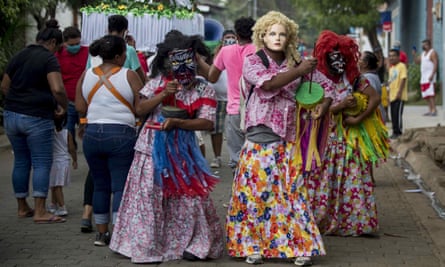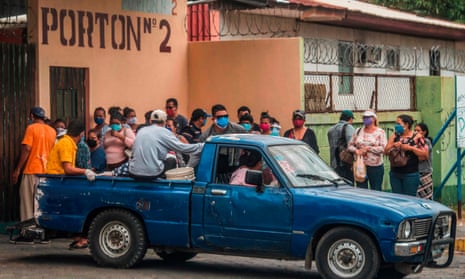Shortly after midnight, five ambulances pull up at the German Nicaraguan hospital in Managua – lights flashing, but no sirens wailing.
The gates quickly close behind them, but reopen after less than half an hour, and the convoy heads out again into the dark streets.
All through the night, ambulances come and go from the hospital, which has become a key battleground in Nicaragua’s fight against the coronavirus.
And alongside them, there is a constant traffic of hearses and pickup trucks, driven by men in full protective gear, ferrying away victims of the pandemic.
Unlike other Central American leaders, President Daniel Ortega has consistently downplayed the scale of the coronavirus threat, refusing to impose social-distancing measures and encouraging mass gatherings of supporters. Officials claim the country has seen just a handful of deaths and insist that there is no community transmission.
Now, however, the government appears to have gone one step further, and is actively attempting to cover up the scale of the disaster.
‼️Una noche en el hospital Alemán Nicaragüense😷
— Wilfredo Miranda (@PiruloAr) May 15, 2020
.
Hilo 🧵
.
➡️Una caravana de ambulancias 🚑 llega cargada de pacientes. En el Alemán solo atienden casos respiratorios y de #Covid19. Fuentes médicas confirman que son pacientes remitidos desde centros de salud con síntomas pic.twitter.com/qwGAdYM3ez
Doctors and health workers say that deaths from Covid-19 are attributed to hypertension, diabetes or respiratory illnesses – and the victims are rushed away for burial in the dead of night.
These “express burials” involve sealed caskets and bodies wrapped in plastic – as recommended by the country’s health ministry in coronavirus deaths – but the dead are not included in the official Covid-19 death toll.
The German Nicaraguan hospital is the only facility in the country officially designated to handle coronavirus cases – but access has been severely restricted, with armed paramilitaries blocking journalists or family members from entering.
Ana Gabriel Bermúdez was told that her grandfather José Torres died at the German hospital from “respiratory symptoms” last Tuesday.
“They keep saying that it wasn’t Covid-19 – that he died of respiratory problems. But if that’s true, why did they send him to be buried straight away – and why were just two family members allowed at the burial?” she asked.
A growing number of bereaved families have reported similar experiences, and the wave of “express burials” has only deepened doubts over Nicaragua’s official figures.
Last week, the health ministry said that the country had seen 25 coronavirus cases, and seven deaths. But according to the Civil Society Covid-19 Observatory – a multi-disciplinary group of medical workers and activists – the country has seen more than 1,200 suspected cases and as many as 233 deaths. The Observatory also published a letter by more than 700 doctors stating that community transmission is taking place.
Distrust of the official figures has only been deepened by the government’s response to the pandemic. Ortega – who once helped lead the Sandinista rebels to victory over the dictator Anastasio Somoza, was not seen in public for more than a month at the start of the outbreak – only to reappear with a televised speech in which he described coronavirus as a “sign from God” against US warmongering.

In the absence of Ortega – who two years ago survived a popular uprising during which more than 300 people were killed – the public face of the official response has been his wife and vice-president, Rosario Murillo, who dismissed reports of express burials as “fake news”.
When more than 500 Nicaraguan health professionals signed a letter calling on the government to take urgent action to prevent a disastrous surge in cases, Murillo dismissed them as “extraterrestrials.”
“They live in another galaxy, they live in a mental bubble – and that’s where they make up these lies. Out of touch with the suffering of the people, they make up this false news, these campaigns of panic,” she told reporters.
Such talk has failed to reassure ordinary Nicaraguans.
Vladimir Rodríguez, a loyal supporter of Ortega and believer in the Sandinista revolution, lost both his brother and his aunt last week. He refuses to believe that they both died of toxic shock related to pneumonia, as he was told at hospital.
“If my brother and my aunt both died from normal pneumonia, why didn’t they let us hold a wake like you would for any other death?” he asked. “The doctors are scared to tell the truth. One of them told us that he couldn’t write Covid-19 on the death certificate because it was an order from the vice-president.”
With another family member sick with coronavirus-like symptoms, Rodríguez seemed disillusioned and bitter.
“We used to support Ortega, but we are very disappointed. The risk from this virus is real – it’s not fake news,” he said.
